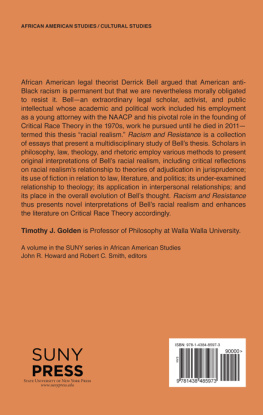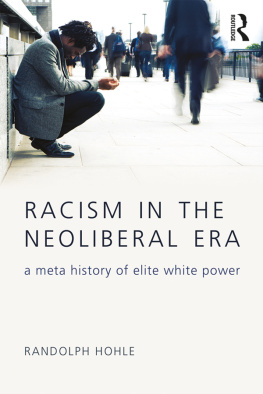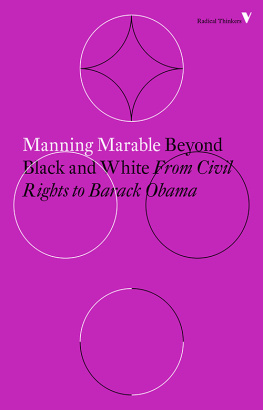Faces at the Bottom of the Well
ALSO BY DERRICK BELL
And We Are Not Saved: The Elusive Quest for Racial Justice (1987)

Grateful acknowledgment is made for permission to reprint from the following:
Puzzled, from Selected Poems by Langston Hughes. Copyright 1948 by Alfred A. Knopf, Inc. Reprinted by permission of the publisher.
The Ones Who Walk Away from Omelas, copyright 1973 by Ursula K. Le Guin; first appeared in New Dimensions 3; excerpted by permission of the author and the authors agent, Virginia Kidd.
Library of Congress Cataloging-in-Publication Data
Bell, Derrick A.
Faces at the bottom of the well: the permanence of racism/by Derrick Bell.
p. cm.
Includes bibliographical references and index.
ISBN-13 978-0-786-72323-2
1. RacismUnited States. 2. United StatesRace relations. 3. Afro-AmericansCivil rights. I. Title.
E185.615.B395 1992
305.800973dc20
9159020
CIP
Copyright 1992 by Basic Books,
A Member of the Perseus Books Group
All rights reserved. Printed in the United States of America. No part of this book may be reproduced in any manner whatsoever without written permission except in the case of brief quotations embodied in critical articles and reviews. For information, address Basic Books, 387 Park Avenue South, New York, NY 10016-8810.
Designed by Ellen Levine
DHSB 34 33
Black people are the magical faces at the bottom of societys well. Even the poorest whites, those who must live their lives only a few levels above, gain their self-esteem by gazing down on us. Surely, they must know that their deliverance depends on letting down their ropes. Only by working together is escape possible. Over time, many reach out, but most simply watch, mesmerized into maintaining their unspoken commitment to keeping us where we are, at whatever cost to them or to us.
D. B.
CONTENTS


AT THE OUTSET, let me assure her many friends that the lawyer-prophet Geneva Crenshaw, the fictional heroine of And We Are Not Saved: The Elusive Quest for Racial Justice, has returned. In that earlier book, through a series of allegorical stories, she and I discussed the workingsand the failuresof civil rights laws and policies. Here, I again enlist the use of literary models as a more helpful vehicle than legal precedent in a continuing quest for new directions in our struggle for racial justice, a struggle we must continue even ifas I contend hereracism is an integral, permanent, and indestructible component of this society.
The challenge throughout has been to tell what I view as the truth about racism without causing disabling despair. For some of us who bear the burdens of racial subordination, any truthno matter how direis uplifting. For others, it may be reassuring to remember Paulo Freires words: Freedom is acquired by conquest, not by gift. It must be pursued constantly and responsibly. Freedom is not an ideal located outside of... [the individual]; nor is it an idea which becomes
Albert Camus, too, saw the need for struggle even in the face of certain defeat: Man is mortal. That may be; but let us die resisting; and if our lot is complete annihilation, let us not behave in such a way that it seems justice!
Fanon argued two seemingly irreconcilable points, and insisted on both. On the one hand, he believed racist structures to be permanently embedded in the psychology, economy, society, and culture of the modern worldso much so that he expressed the belief that a true culture cannot come to life under present conditions. Fanons book was enormously pessimistic in a victory sense. He did not believe that modern structures, deeply poisoned with racism, could be overthrown. And yet he urged resistance. He wrote a bookperhaps to remind himself that material or cultural fate is only part of the story.
While Martin Luther King spoke much about racial justice in integrationist terms, in an essay, A Testament of Hope, published after his death, he wrote of his setbacks, the time he So, while Dr. King led a struggle toward a goalracial equalitythat seemed possible, if not quite feasible, in the 1960s, there was a deeper message of commitment to courageous struggle whatever the circumstances or the odds. A part of that struggle was the need to speak the truth as he viewed it even when that truth alienated rather than unified, upset minds rather than calmed hearts, and subjected the speaker to general censure rather than acclaim.
Statements of faith by men who had thought deeply about the problems of human life, whether white or black, encouraged me in writing this book. And I was moved and motivated by the courageous example of the many black people with whom I worked in the South during my years as a civil rights lawyer. Judge Robert L. Carter, one of the leading attorneys in the NAACPs school desegregation litigation, has spoken of this courage when, back in the early 1950s, whites exerted economic pressures to curb the new militancy among blacks who were joining lawsuits challenging segregation. In that climate, Carter and the other lawyers urged parents to consider carefully the risks before making a final commitment to join in the litigation. That so few stepped back still astounds me, says Carter.
Carters observation takes me back to the summer of 1964. It was a quiet, heat-hushed evening in Harmony, a small black community near the Mississippi Delta. Some Harmony residents, in the face of increasing white hostility, were organizing to ensure implementation of a court order mandating desegregation of their schools the next September. Walking with her up a dusty, unpaved road toward her modest home, I asked one of the organizers, Mrs. Biona MacDonald, where she and the other black families found the courage to continue working for civil rights in the face of intimidation that included blacks losing their jobs, the local banks trying to foreclose on the mortgages of those active in the civil rights movement, and shots fired through their windows late at night.
Mrs. MacDonald looked at me and said slowly, seriously, I cant speak for everyone, but as for me, I am an old woman. I lives to harass white folks.
Since then, I have thought a lot about Mrs. MacDonald and those other courageous black folk in Leake County, Mississippi, particularly Dovie and Winson Hudson. Remembering again that long-ago conversation, I realized that Mrs. MacDonald didnt say she risked everything because she hoped or expected to win out over the whites who, as she well knew, held all the economic and political power, and the guns as well. Rather, she recognized thatpowerless as she wasshe had and intended to use courage and determination as a weapon to, in her words, harass white folks.
As I do throughout this book, Mrs. MacDonald assumed that I knew that not all whites are racist, but that the oppression she was committed to resist was racial and emanated from whites. She did not even hint that her harassment would topple those whites well-entrenched power. Rather, her goal was defiance, and its harassing effect was likely more potent precisely because she did what she did without expecting to topple her oppressors. Mrs. MacDonald avoided discouragement and defeat because at the point that she determined to resist her oppression, she was triumphant. Her answer to my question reflected the value of that triumph, explained the source of courage that fueled her dangerous challenge to the white power structure of that rural Mississippi county. Nothing the all-powerful whites could do to her would diminish her triumph.
Next page








